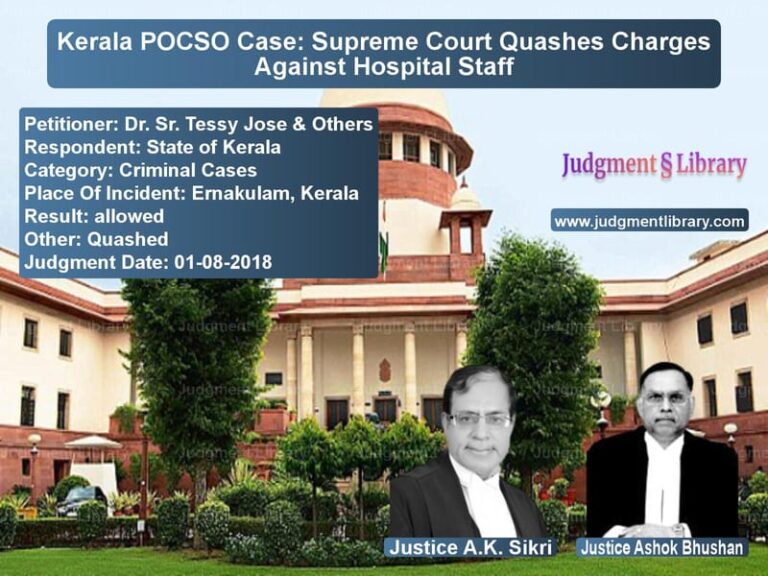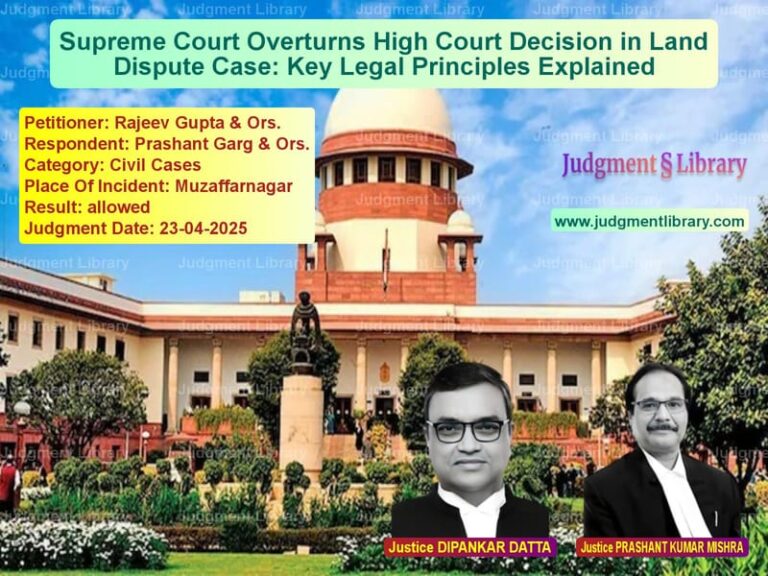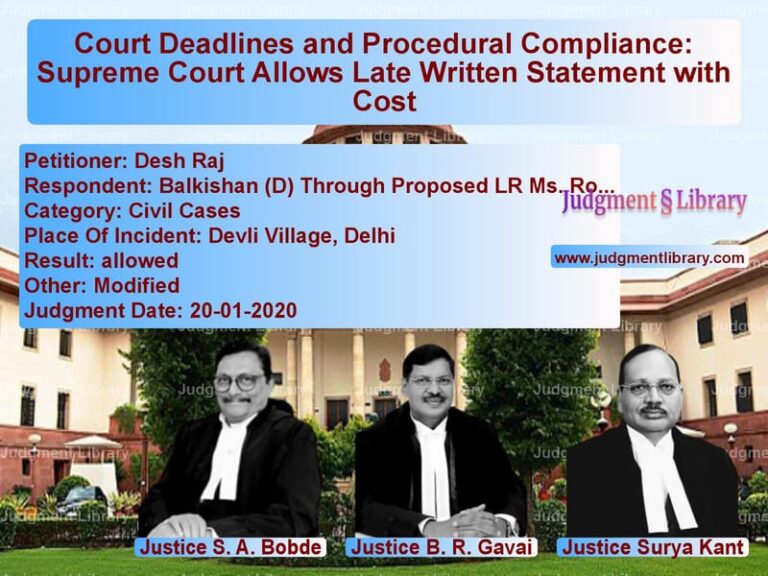Judicial Review of Fee Enhancement and Refund in Private Medical Colleges
The case discussed in this judgment involves an appeal filed by the Kerala State Electricity Board (KSEB) and the Union of India, challenging the decision of the High Court of Kerala which set aside a Government Order (G.O.) enhancing tuition fees for private medical colleges in Andhra Pradesh. The appellant, Narayana Medical College, argued that the fee increase should be allowed, but the High Court had quashed the G.O., ruling that the fee increase was unauthorized and illegal, as it was made without the recommendations of the Andhra Pradesh Admission and Fee Regulatory Committee (AFRC), as stipulated under the Rules of 2006.
Background of the Case
The dispute began with the Kerala State Electricity Board (KSEB), which, under the provisions of the Rules, 2006, had been tasked with the responsibility to regulate the fee structure for private medical colleges in the state. In 2017, the KSEB unilaterally increased the tuition fees for private medical colleges, including Narayana Medical College, in violation of the regulatory procedures. The increase was excessive, amounting to an enhancement of nearly seven times the previous fee. The fee hike was challenged by the respondent, Rubfila International Ltd., which argued that the increase was not authorized by the AFRC, as required by the 2006 Rules. Following this, the High Court of Kerala ruled in favor of the respondent, directing the medical college to refund the additional fees collected. The appellants sought to appeal this decision, which was later brought before the Supreme Court for judicial review.
Read also: https://judgmentlibrary.com/icsi-election-dispute-supreme-court-reinstates-elected-office-bearers/
The Legal Arguments
The appellants contended that the fee enhancement was necessary due to various operational and infrastructural factors, including the increasing cost of running the medical colleges and providing stipends to students. They argued that the fee structure determined by the AFRC in 2011 was no longer adequate, and hence the enhancement was justified. The appellants further submitted that despite the procedural lapse, the fee increase was reasonable and necessary to maintain the quality of education and infrastructure in private medical colleges.
In response, the respondents (the students and their representatives) argued that the fee increase violated the principles of fairness and transparency set forth in the 2006 Rules. They pointed out that the fee increase was made unilaterally by the state government without consultation with the AFRC, which was mandated to conduct an inquiry and make recommendations regarding the fee structure. The respondents also highlighted that the fee increase imposed by the government was exorbitant, and many students had been forced to take loans to pay the inflated fees, which had imposed an undue financial burden on them.
The Court’s Consideration
The Supreme Court, in its deliberation, examined the provisions of the 2006 Rules, which govern the regulation of fees in private medical colleges. It noted that under Rule 4 of the 2006 Rules, the AFRC had the sole authority to determine and review the fee structure, and the state government could not unilaterally alter the fees without the AFRC’s recommendations. The Court also referred to previous judgments, including the landmark P.A. Inamdar case, which emphasized the importance of transparency and regulation in the fixation of tuition fees for private institutions.
The Court observed that the appellants had relied on the representations made by private medical colleges, which had argued that the existing fee structure was insufficient to cover operational costs. However, the Court was concerned that the fee increase had been implemented without following the proper procedural safeguards outlined in the 2006 Rules. The Court emphasized that the state government’s action in unilaterally increasing the fees without waiting for the AFRC’s report was illegal and arbitrary, and the High Court was correct in setting aside the G.O. enhancing the fees.
The Court further examined the arguments regarding the excessive fee increase, noting that the G.O. had increased the tuition fees to Rs. 24 lakhs per annum, which was seven times the earlier fee. The Court found that such an increase was unjustifiable, as it was not supported by any detailed inquiry or recommendation from the AFRC. The Court reiterated that education, particularly in professional courses, should not be commercialized, and fees should be kept reasonable and within the parameters set by the AFRC.
The Court’s Judgment
The Supreme Court agreed with the findings of the High Court and dismissed the appeals filed by the appellants. The Court upheld the High Court’s decision to quash the G.O. dated 06.09.2017, which had enhanced the tuition fees for private medical colleges. The Court emphasized that the fee increase was made without the necessary recommendations from the AFRC, which was in clear violation of the Rules of 2006. The Court also directed that the medical colleges refund the excess fees collected from the students, after adjusting the fees as per the G.O. of 2011.
Furthermore, the Court rejected the appellants’ arguments regarding the financial necessity of the fee increase and the operational challenges faced by the colleges. The Court held that any increase in tuition fees must be supported by a thorough inquiry conducted by the AFRC, and the state government could not bypass this process.
Conclusion
The Supreme Court’s judgment in this case reinforces the importance of regulatory oversight in the fixation of tuition fees in private educational institutions. It highlights the need for transparency and adherence to established procedures to ensure that fee increases are justified and do not impose an undue financial burden on students. The judgment also serves as a reminder that education should not be treated as a commercial enterprise and that the state government must comply with the legal frameworks set forth in the rules to protect the interests of students.
Petitioner Name: Narayana Medical College.Respondent Name: State of Andhra Pradesh & Ors..Judgment By: Justice M.R. Shah, Justice C.T. Ravikumar.Place Of Incident: Andhra Pradesh.Judgment Date: 07-11-2022.
Don’t miss out on the full details! Download the complete judgment in PDF format below and gain valuable insights instantly!
Download Judgment: narayana-medical-col-vs-state-of-andhra-prad-supreme-court-of-india-judgment-dated-07-11-2022.pdf
Directly Download Judgment: Directly download this Judgment
See all petitions in unfair trade practices
See all petitions in Corporate Governance
See all petitions in Bankruptcy and Insolvency
See all petitions in Judgment by Mukeshkumar Rasikbhai Shah
See all petitions in Judgment by C.T. Ravikumar
See all petitions in dismissed
See all petitions in supreme court of India judgments November 2022
See all petitions in 2022 judgments
See all posts in Corporate and Commercial Cases Category
See all allowed petitions in Corporate and Commercial Cases Category
See all Dismissed petitions in Corporate and Commercial Cases Category
See all partially allowed petitions in Corporate and Commercial Cases Category







